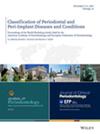Relationship between Mediterranean diet and periodontal inflammation in a UK population: A cross-sectional study.
IF 3.8
2区 医学
Q1 DENTISTRY, ORAL SURGERY & MEDICINE
引用次数: 0
Abstract
BACKGROUND Evidence is emerging about the effects of a balanced nutrition in maintaining periodontal health. The aim of this project was to investigate the association between diet, severity of periodontitis, and periodontal and systemic inflammation. METHODS Two hundred consecutive hospital patients underwent a full periodontal assessment, had blood samples taken, and filled out a food frequency questionnaire (FFQ). Adherence to a Mediterranean-type diet was assessed through the FFQ. High-sensitivity C-reactive protein (hs-CRP) serum levels of matrix metalloproteinases-8 (MMP-8), interleukin (IL)-1α, IL-1β, IL-6, IL-10, and IL-17 were analyzed. Correlation and multivariate logistic regression analyses were performed to test the relationships between dietary factors, inflammatory biomarkers, and clinical data. RESULTS A total of 195 patients had complete data, with 112 participants categorized as highly adherent to the Mediterranean diet. Multivariate analysis showed that low adherence to Mediterranean diet was associated to periodontitis stage III-IV (p = 0.055, odds ratio [OR] 0.35, 95% confidence interval [CI]: 0.12-0.89); among individual food groups, more frequent red meat consumption was independently associated with more severe periodontitis stage (p = 0.042, OR 2.75, 95% CI: 1.03-7.41). Periodontal disease severity showed moderate associations with both circulating hs-CRP and IL-6 in the univariate analysis, but only IL-6 association was confirmed after adjusting for confounders. Consumption of several plant-derived food groups was significantly inversely related to increased levels of hs-CRP, IL-1α, IL-6, IL-10, and IL-17. CONCLUSIONS This study shows that low adherence to Mediterranean diet and higher red meat consumption may be associated with severity of periodontal disease. Studies with a larger sample size are needed to further clarify the current findings. PLAIN LANGUAGE SUMMARY This study explored how everyday eating habits might impact gum health and overall inflammation. We evaluated 200 hospital patients by performing dental exams, taking blood samples, and asking them about their diets through questionnaires. In particular, we looked at how closely people followed a Mediterranean-style diet, known for its emphasis on fruits, vegetables, whole grains, and healthy fats. Our findings revealed that patients who did not follow the Mediterranean diet as closely tended to have more severe gum disease, especially if they consumed red meat frequently. We also observed that higher levels of a key inflammatory marker, such as interleukin-6 (IL-6), were linked to worse gum health, while diets rich in plant-based foods were associated with lower levels of various inflammatory markers. These results suggest that a balanced, Mediterranean-type diet could be important in reducing gum disease and systemic inflammation. Further studies with larger groups are needed to confirm these promising observations.地中海饮食与牙周炎症在英国人群中的关系:一项横断面研究。
背景:关于均衡营养对维持牙周健康的作用的证据越来越多。该项目的目的是调查饮食、牙周炎的严重程度以及牙周和全身炎症之间的关系。方法连续200例住院患者接受了全面的牙周评估,采集了血液样本,并填写了食物频率问卷(FFQ)。通过FFQ评估地中海型饮食的依从性。分析血清基质金属蛋白酶-8 (MMP-8)、白细胞介素(IL)-1α、IL-1β、IL-6、IL-10、IL-17的高敏c反应蛋白(hs-CRP)水平。通过相关和多变量逻辑回归分析来检验饮食因素、炎症生物标志物和临床数据之间的关系。结果共195例患者有完整的数据,其中112例参与者被归类为高度坚持地中海饮食。多因素分析显示,低依从性地中海饮食与牙周炎III-IV期相关(p = 0.055,优势比[OR] 0.35, 95%可信区间[CI]: 0.12-0.89);在单个食物组中,更频繁地食用红肉与更严重的牙周炎阶段独立相关(p = 0.042, OR 2.75, 95% CI: 1.03-7.41)。在单变量分析中,牙周病严重程度与循环hs-CRP和IL-6均显示中度相关性,但在调整混杂因素后,仅证实了IL-6的相关性。食用几种植物性食物组与hs-CRP、IL-1α、IL-6、IL-10和IL-17水平升高呈显著负相关。结论:本研究表明,低坚持地中海饮食和多食用红肉可能与牙周病的严重程度有关。需要更大样本量的研究来进一步阐明目前的发现。这项研究探讨了日常饮食习惯如何影响牙龈健康和整体炎症。我们对200名医院病人进行了评估,方法是进行牙科检查,采集血液样本,并通过问卷调查询问他们的饮食情况。我们特别研究了人们在多大程度上遵循地中海式饮食,这种饮食以强调水果、蔬菜、全谷物和健康脂肪而闻名。我们的研究结果显示,没有严格遵循地中海饮食的患者往往患有更严重的牙龈疾病,特别是如果他们经常食用红肉。我们还观察到,较高水平的关键炎症标志物,如白细胞介素-6 (IL-6),与牙龈健康状况恶化有关,而富含植物性食物的饮食与各种炎症标志物水平较低有关。这些结果表明,平衡的地中海式饮食可能对减少牙龈疾病和全身炎症很重要。需要更大规模的进一步研究来证实这些有希望的观察结果。
本文章由计算机程序翻译,如有差异,请以英文原文为准。
求助全文
约1分钟内获得全文
求助全文
来源期刊

Journal of periodontology
医学-牙科与口腔外科
CiteScore
9.10
自引率
7.00%
发文量
290
审稿时长
3-8 weeks
期刊介绍:
The Journal of Periodontology publishes articles relevant to the science and practice of periodontics and related areas.
 求助内容:
求助内容: 应助结果提醒方式:
应助结果提醒方式:


